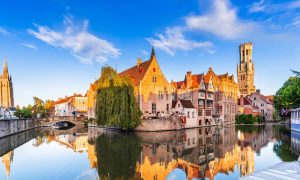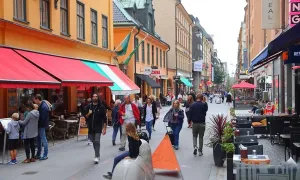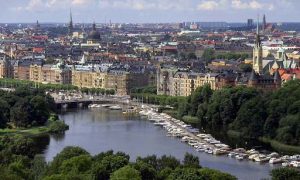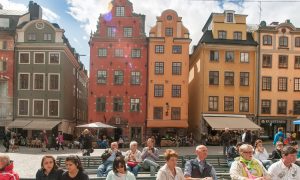Sweden has always attracted a large number of people due to its high quality of life, excellent welfare system and beautiful nature.Overseas Immigration. However, with the globalimmigrantsChanges in the situation as well as adjustments in the social and economic situation within Sweden, the Swedish government is also continuously adapting its migration policy to new needs and challenges. 2025.Swedish immigration policyA number of important reforms and changes are coming. These changes will not only affect the application process for immigrants, but may also change the way immigrants live and work in Sweden. This article will detail the 2025Immigration to SwedenRecent changes in the law and the trends they may bring.
1. Immigration to SwedenBackground to policy reform
Sweden has always had a liberal immigration policy, particularly with regard to the admission of refugees and family reunification. However, in recent years, Sweden's immigration policy has gradually become stricter, especially in the context of the surge in the immigrant population and the increased pressure on public services, and the Swedish government has begun to re-examine the current immigration law. Under the proposed reform for 2025, theSwedish immigration policyIt will develop in the direction of greater rationalization and in line with the needs of socio-economic development.
The main objective of the reform is to equalize the distribution of social welfare resources and to ensure that immigrants are well integrated into Swedish society and make a positive contribution to Sweden's economic and social development.
2. New visa and residence permit requirements
Under the Migration Policy Reform 2025, Sweden will introduce stricter screening criteria into the existing system of visas and residence permits. The new reform will focus on the following areas:
- Increased requirements for work visas: With the changes in the Swedish labor market, the new policy requires applicants for work visas to provide more detailed proof of occupational skills and proof of language proficiency. Especially in highly skilled industries and shortage occupations, immigrants will need to have the appropriate skills or academic background in order to successfully obtain a work visa.
- Adjustment of residence permits for job seekers: The Swedish government will introduce a new type of residence permit specifically for international students who have recently graduated and are looking for work in Sweden. This policy is intended to encourage highly qualified young people to stay and work in Sweden and contribute to Sweden's innovative economy.
- Optimization of family reunification policy: Although the Swedish Government still supports the policy of family reunification, the conditions for applying for family reunification will become stricter under the reform program. Applicants will be required to provide more proof of financial support to ensure that they are self-sufficient and make a positive contribution to Swedish society.
3. Tightening of the refugee admission policy
Sweden's refugee reception policy has traditionally been liberal, but due to the migratory pressures faced by other European countries in recent years, Sweden's refugee reception system has faced great challenges. In order to ensure a balance between the social integration of immigrants and the allocation of resources, in the 2025 reform the Swedish government will strictly adjust the criteria for accepting refugees.
- Stricter refugee eligibility: Sweden will strengthen the criteria for vetting applications for refugee status. Refugees will only be granted asylum if the criteria are in accordance with international law and Swedish law. And for those who fail to prove their refugee status, the Swedish Government will adopt a stricter repatriation policy.
- Changes in refugee resettlement policy: Sweden will take a more decentralized approach to refugee resettlement, and instead of concentrating resettlement in some of the major cities, will consider resettling refugees in small towns and rural areas in order to relieve the pressure on the major cities and achieve a more balanced distribution of social resources.
4. Measures to promote the social integration of migrants
The Swedish Government recognizes that a successful migration policy is not just about accepting migrants, but also about integrating them into Swedish society, and the reform of the Migration Act in 2025 will introduce a number of new measures aimed at facilitating the integration of migrants into society.

- Reinforcement of Swedish language learning: The Government of Sweden will intensify its efforts toImmigration to SwedenIn order to support the Swedish language, all immigrants will be required to attend a language training course (SFI), and the content of the course will be more focused on the Swedish language commonly used in life and work. In addition to language learning, immigrants will also receive cultural adaptation courses to help them better understand Swedish social customs and laws and regulations.
- Migrant employment support: The Swedish Government will provide more employment training and vocational counseling services, especially for those immigrants whose skills do not match. The new policy will encourage immigrants to participate in vocational training and improve their competitiveness in the Swedish job market. In addition, the Government plans to expand support for immigrant small businesses to help them integrate into the Swedish business environment.
- Balance of social benefits: The Swedish Government will strengthen the management of social benefits for immigrants, especially in the application process for social benefits, to ensure that immigrants are able to utilize welfare resources wisely. The new reforms will result in a fairer distribution of welfare resources and ensure that immigrants who are genuinely in need of help are supported without abusing the welfare system.
5. Future trends in reform
Reform of Sweden's migration policy will not happen overnight, but will be a gradual process.The reforms that will begin in 2025 will be the first in the coming years toSwedish immigration policyThe basis for realignment. Here are a few future trends to watch:

- Prioritization of highly skilled migrants: The Swedish Government will place greater emphasis on attracting highly skilled immigrants, especially in the fields of science and technology, engineering, medicine and education. This will enable the Swedish economy to remain innovative and meet the labor market's demand for highly skilled people.
- Strengthening of regional migration policies: In the future, Sweden may develop a more targeted immigration policy based on the social and economic needs of different regions. For example, for sparsely populated rural areas, the Swedish government may offer more incentives for immigrants to boost the local economy.
- Deepening of international cooperation: Sweden will work globally with other countries to promote harmonization of global migration policies. Sweden will continue to support the protection of the rights and interests of refugees and immigrants, while promoting fairness and rationalization in the admission of immigrants.
6. Conclusion
Sweden's migration policy reforms are a positive response to the current needs of society and aim to create a fairer, more rational and sustainable migration system.The new changes to the migration law, which will be implemented in 2025, will provide an opportunity for those who are interested inImmigration to Swedenof the population offer new opportunities, but at the same time present a number of challenges. Understanding and adapting to these changes will help immigrants to better integrate and succeed in Swedish society. Against the backdrop of changing global migration trends and policies, Sweden's immigration law reform will certainly serve as an important reference for future immigration policy developments.






